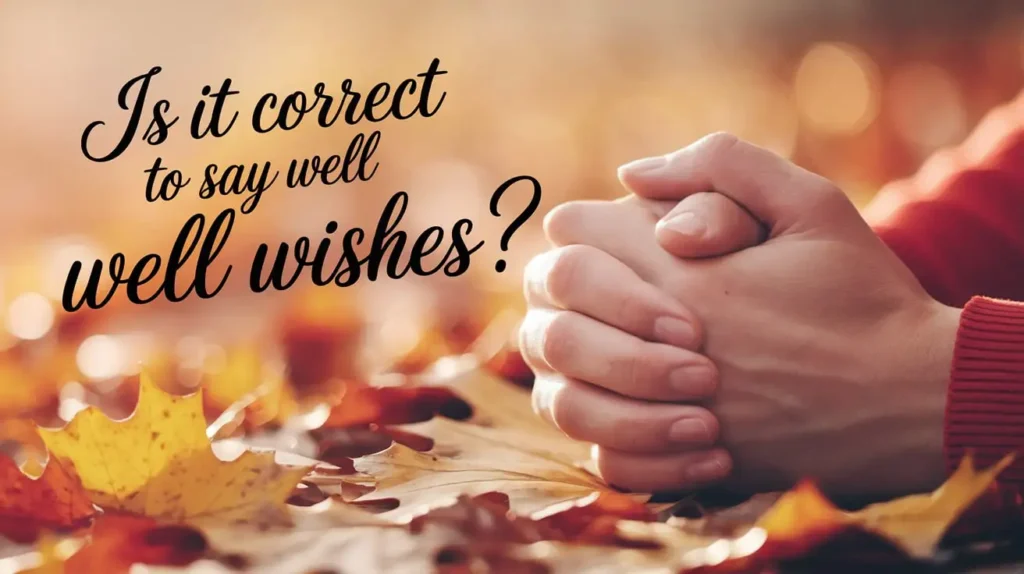The phrase “well wishes” is one that many of us use regularly, often when sending heartfelt sentiments to friends or family. But is it grammatically correct? Is it the best way to express goodwill? While you may hear this expression all the time, it’s important to consider both its grammatical soundness and its appropriateness in different contexts. Understanding when and how to use “well wishes” properly can help you communicate more effectively and sound natural in various social situations.
In this article, we’ll dive into the meaning of “well wishes,” its grammatical accuracy, common alternatives, and when it’s appropriate to use. We’ll also explore why people continue using the phrase, potential misunderstandings, and expert opinions on language usage. By the end, you’ll have a solid understanding of whether or not it’s correct to say “well wishes” and how to use it properly.
What Does “Well Wishes” Mean?
To start, let’s break down the phrase itself. The term “well wishes” refers to a combination of two simple words: “well” and “wishes.”
- “Well” expresses the desire for something good or beneficial. It’s often used to describe health, success, or happiness.
- “Wishes” refers to hopes or desires for someone’s future.
When put together, “well wishes” conveys the idea of sending positive thoughts, hopes, or good intentions toward someone, especially in times of change or need. It’s a kind way to let someone know you’re thinking about them, whether it’s after an illness, during a major life change, or just as a part of a special occasion.
For example, you might say, “I’m sending you well wishes for your speedy recovery,” or “Well wishes for a joyful new year ahead!” It’s clear, friendly, and compassionate. But does it always sound natural, and is it grammatically correct? That’s where things get a little more complex.
Is “Well Wishes” Grammatically Correct?
When it comes to grammar, “well wishes” isn’t as straightforward as it might seem. The phrase feels intuitive in casual conversation, but linguists and grammar experts have varying opinions about its correctness.
In traditional grammar, a phrase like “well wishes” may feel somewhat awkward to some. While it’s commonly used in informal settings, the phrase’s structure might be questioned by those with a keen eye for formal language rules. The word “well” is an adjective, and “wishes” is a noun, which creates a slight mismatch in terms of grammatical expectation. Typically, we use adjectives to modify nouns, but the way “well” modifies “wishes” doesn’t follow a traditional adjective-noun relationship.
Despite this, the phrase is widely accepted in modern speech and writing, especially in informal contexts. People use it to express compassion or positive intentions without worrying too much about the rules. Language is constantly evolving, and expressions like “well wishes” have been around long enough that they’ve gained popularity.
What Do Grammar Experts Say?
Some grammar experts argue that while the phrase may sound informal, it’s acceptable because language evolves to reflect how people actually speak. “Well wishes” may not align with strict grammar rules, but it’s widely used and understood. For example, many common phrases in English break traditional grammatical structures, yet they remain perfectly acceptable due to their frequent use.
Others argue that alternatives such as “best wishes” or “good wishes” are more grammatically sound because they maintain a clearer structure. “Best” and “good” are both adjectives, and “wishes” is the noun they modify, which creates a more logical grammatical pairing.
Common Alternatives to “Well Wishes”
While “well wishes” is widely used, it’s not the only option available when you want to send good thoughts or positive intentions. Below, we’ll explore some of the most popular alternatives that might better suit certain contexts.
1. Best Wishes
Perhaps the most common and universally accepted alternative to “well wishes” is “best wishes.” This phrase is grammatically clean, with the adjective “best” modifying the noun “wishes.” It’s appropriate for nearly any occasion, whether you’re sending someone off on a new journey, celebrating an achievement, or simply extending a friendly sentiment. It’s used in both casual and formal settings, making it incredibly versatile.
Example: “Best wishes for your wedding day!”
2. Good Wishes
“Good wishes” is another grammatically sound alternative, though it’s slightly less popular than “best wishes.” It conveys a similar sentiment but with a slightly softer tone. This phrase can also work well in both personal and professional contexts.
Example: “I’m sending you good wishes for your promotion.”
3. Best of Luck
“Best of luck” is frequently used, particularly when someone is about to face a challenge or embark on something new. It’s often seen in situations like job interviews, exams, or competitive events.
Example: “Best of luck on your final exam!”
4. Sending You Positive Thoughts
This alternative might not be as widely used as the others, but it has gained some popularity in recent years. It’s a more neutral phrase that expresses good intentions and support without specifically focusing on “wishes.”
Example: “I’m sending you positive thoughts as you start this new chapter.”
When Is It Appropriate to Say “Well Wishes”?
Although “well wishes” is widely understood, it’s important to be mindful of when it’s appropriate to use the phrase. Here are a few key occasions where “well wishes” is a perfect fit:
1. Special Occasions
Weddings, birthdays, anniversaries, and other milestones are classic moments to offer well wishes. Whether it’s a new beginning or a significant celebration, the phrase conveys warmth and good intentions.
Example: “Well wishes to you on your wedding day!”
2. Health-Related Situations
After surgery, during illness, or when someone is recovering from an injury, “well wishes” can be a comforting way to show you care. It’s personal and offers hope without being overly formal.
Example: “I’m sending you well wishes for a speedy recovery.”
3. New Beginnings
When someone is about to start something new—whether it’s a job, a big move, or a significant life change—saying “well wishes” adds a layer of support and optimism.
Example: “Good luck on your new job, and well wishes for the future!”
4. Cultural Sensitivity
While “well wishes” is commonly used in Western contexts, in other parts of the world, people may have different expressions that are more common. Being aware of local customs and language norms can help you avoid awkwardness or misunderstanding when offering well wishes.
Why Do People Use “Well Wishes”?
So, why does “well wishes” continue to be a popular expression, even if it’s not always grammatically perfect? One reason is its warmth and personal tone.
Unlike some more formal phrases, “well wishes” feels intimate and thoughtful. It’s often used between people who have a strong connection, and it expresses care in a way that feels less distant than the more neutral “best wishes.” It’s a phrase that conveys not just a wish for someone’s success but a sincere desire for their happiness and well-being.
Common Misunderstandings of “Well Wishes”
Despite its widespread use, “well wishes” can sometimes be misunderstood or misused, especially in formal or professional contexts. For instance, while it might feel appropriate to use in a casual letter to a friend, using it in a business email may come off as too informal or unprofessional.
In such cases, a phrase like “best regards” or “sincerely” might be a more fitting choice, depending on the situation. It’s always a good idea to gauge the tone of the conversation before choosing the phrase that best matches the mood and setting.
Expert Opinions on Language Usage
Linguists and grammar experts generally agree that language is constantly evolving. While “well wishes” might not strictly follow traditional grammatical rules, its widespread use has made it a part of everyday language. As with many common expressions, it’s the context that determines whether a phrase is considered acceptable.
The general consensus is that while better alternatives exist, “well wishes” is still valid, especially in informal settings. Many experts believe that expressions like these add to the flair and richness of language, allowing it to grow and change to reflect modern sensibilities.
FAQs About “Well Wishes”
1. Is it grammatically correct to say “well wishes”?
The phrase “well wishes” is widely used and understood, but some grammar experts consider it grammatically awkward because “well” is not typically used as an adjective in this way. However, in casual and informal settings, it is acceptable and conveys goodwill effectively.
2. What is a better alternative to “well wishes”?
More grammatically correct alternatives include:
- Best wishes (most common and widely accepted)
- Good wishes
- Best of luck
- Warm wishes
- Sending positive thoughts
3. When should I use “well wishes”?
You can use “well wishes” when expressing support, encouragement, or goodwill, especially in casual conversations. It’s often used for:
- Birthdays and celebrations
- Health and recovery messages
- New job or life changes
- Weddings and anniversaries
4. Is “well wishes” appropriate in professional settings?
In formal or professional communication, “best wishes” or “kind regards” are better choices. “Well wishes” is acceptable in personal emails but may feel too informal in business contexts.
5. Why do people say “well wishes” if it’s not grammatically perfect?
Language constantly evolves, and common usage often overrides strict grammar rules. “Well wishes” has become a familiar phrase because it sounds natural and conveys warmth.
Conclusion
In conclusion, “well wishes” is a phrase that holds meaning for many people, even if it doesn’t strictly adhere to traditional grammar rules. It’s widely understood and commonly used to express kindness, goodwill, and optimism. While there are grammatically sound alternatives, the use of “well wishes” isn’t wrong. It’s simply a matter of knowing when it’s appropriate to use.
Whether you prefer “best wishes,” “good wishes,” or “well wishes,” the most important thing is to genuinely convey your good intentions. Choose the phrase that feels right for the situation, and always ensure that your words reflect the sentiment you want to express.

Shin Kyung is a passionate numerologist and spiritual guide dedicated to exploring the profound meanings behind angel numbers. With a unique blend of intuition and research, Shin empowers readers to unlock the hidden messages from the universe and embrace their spiritual journeys.



